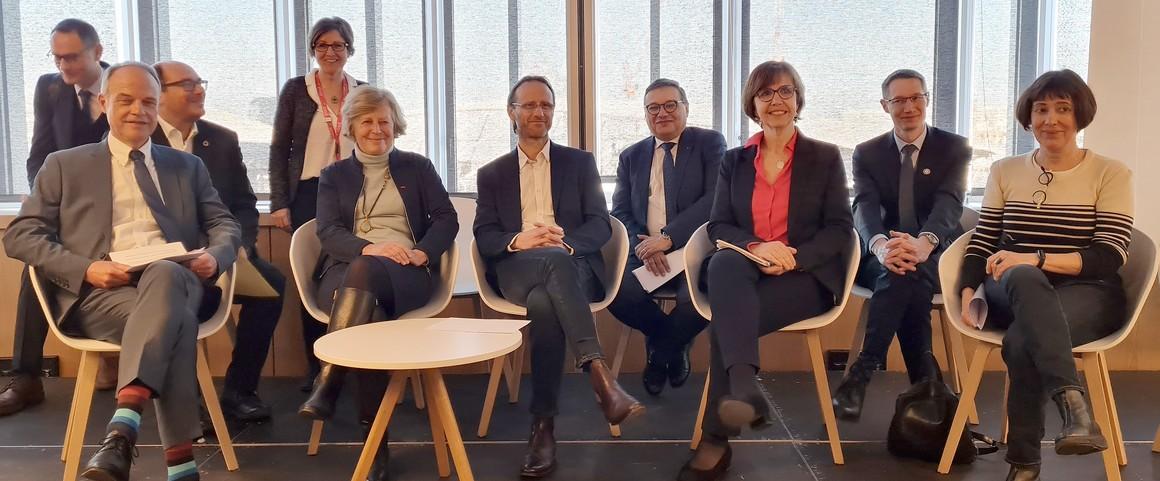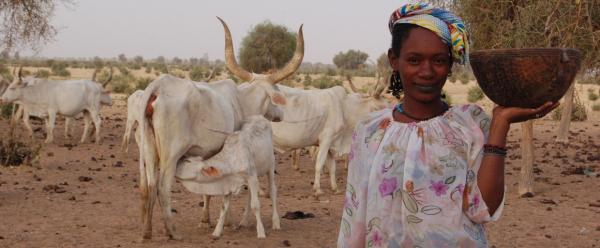Event 9 December 2025
- Home
- CIRAD news
- News
- Dialogue between scientists, policy makers in preventing pandemics
Preventing pandemics: dialogue between scientists, policy makers and civil society takes off at last

Speakers and organizers of the roundtables “What science-society-policy dialogue in the prevention of pandemic risks?”, organized by PREZODE on the occasion of the 2023 International Agricultural Show in Paris © C. Dangléant, CIRAD
“We can no longer continue working separately”, Brigitte Autran sets the tone. The President of the French Committee for the Monitoring and Anticipation of Health Risks (COVARS) looked back on her experience with HIV and dengue fever. She reiterated the importance of interactions between society and the medical and veterinary professions. For her, the One Health approach is “vital”. The dialogue between scientists, policy makers and civil society is “key and essential”.
“All pandemics start with an epidemic, at a community level”. Magda Robalo, President of the Institute for Global Health and Development, has no doubts about One Health approaches. She considers them to be the future. The former Health Minister of Guinea Bissau gives a bitter assessment of the management of the Covid-19 pandemic, both internationally and on a smaller scale. “The pandemic revealed a lack of trust and credibility between political leaders, social actors and scientists. We were not listening to each other”. “A non-existent dialogue that cost lives”, she added.
These comments were made during the roundtables organized by PREZODE, an international initiative that seeks to reduce risks and implement systems for the early detection of epidemics in as many countries as possible. The panel, which convened at the end of February at the International Agricultural Show in Paris, comprised scientific experts, political and development actors, donor representatives and members of civil society, via an NGO representative and a healthcare journalist. They were all won over by the One Health approach and tried to address the thorny issue of “science-society-policy” dialogue in the prevention of pandemic risks.
Trust is built in times of “health peace”
Research time is not the same as policy time. Matthieu Le Grix, Head of the Agriculture, Rural Development and Biodiversity Division of the Agence Française de Développement (AFD) focused on this “first obstacle” to dialogue. “Times of crisis are no longer the time for dialogue”, he declared. Faced with an emergency that polarizes decision-making, the political world is, in fact, confined to the immediate.
This is a position that forces political leaders to rely on pre-existing relationships rather than re dealing the cards and including new stakeholders in the debate. Hence the importance of “times of peace to focus on building such trust”, pointed out Magda Robalo. These “communication bridges” will serve as “savings accounts for use in times of crisis”.
“These new platforms for dialogue need to be built now”, insists Marisa Peyre, an epidemiologist and coordinator of the PREZODE initiative for CIRAD. The scientist, who organized these roundtables, was determined: “the implementation of health policies adapted to the needs of people on the ground will not be possible without these discussion forums. Let’s take advantage of this post-Covid lull to test tools and consolidate the networks needed to prevent epidemics”.
Civil society, between those directly involved and the general public
There is no question of the importance of civil society in the dialogue surrounding pandemic prevention. But whom exactly are we talking about? Emmanuelle Soubeyran, Deputy Director General for Food at the French Ministry of Agriculture and Food Sovereignty made a distinction between two stances: stakeholders, who are required to implement policy solutions, and the general public.
The stakeholders are “those who have something to do”, those for whom policy decisions apply directly. In the management of the current bird flu epizootic in France, Emmanuelle Soubeyran makes reference to “livestock farmers, veterinarians, or laboratories”. Several panellists return to the role of women who “account for the majority of health professionals”, Magda Robalo reminds us.
Serge Breysse, CEO of the NGO Solthis, which works on access to healthcare internationally talks of several of their field activities, demonstrating how important the commitment of people on the front line is. “Many people are not convinced by long term challenges, such as climate change, because they have other, more pressing needs. It is necessary to work on these convictions, but that will involve listening to and responding to their most urgent constraints”.
Are dialogue facilitators the missing link between science, policy and society?
For their part, the media lie at the heart of dialogue with the general public. Florence Pinaud, a healthcare journalist with the La Tribune newspaper, speaks of the emergence of a more diffuse audience that needs the “marketing stimulus” to gain their interest. Storytelling, staging of information with short videos, etc, journalists need to boost their efforts to make their work attractive. Here again, the pace of marketing is much faster than that of science.
In the words of Mathieu Le Grix, others play this role of mediator, or “facilitator”. The AFD, as a “development and international cooperation operator”, is privy to the dialogue between science and policy. This position lies at the heart of being an effective communicator between worlds underpinned by very different constraints.
One by one, Florence Pinaud, Mathieu Le Grix and Serge Breysse return to the need for “information storytelling”, or providing “strong evidence from the field”. A need for mediation that calls for science to take a step towards simplification and for policy makers and civil society to take a step towards complexity.
One Health provides the keys for this new dialogue
“A basic point is sometimes forgotten”, according to Pierre Kempf, deputy head of the Health Division at AFD. “The decisions required at policy level are extremely difficult and need to bring us to a radically different stance from that of today. […] If the decision were simple, it would have been taken long ago”.
For him, “One Health provides the vocabulary to set up this new dialogue”, since it is first and foremost a “method”. “It is the creation of a political Agora for decision-making, rather local or regional. And cross-sectoral of course, community-based, political, institutional and scientific”.
Franck Berthe, a livestock expert at the World Bank and coordinator of the Livestock Global Alliance, emphasizes the importance of international mobilization around One Health projects: “the weight of the local and national context means that countries need to take charge, but we must bear in mind that pathogens do not recognise borders. Regional, multi-country organizations have a key role to play”. He added that such actions had to be funded over the long term “to ensure their impact and longevity. Prevention is an ongoing action”.
"There must be global governance of One Health approaches, and the World Organisation for Animal Health is working on this in collaboration with FAO, WHO and UNEP", promises Jean-Philippe Dop, Deputy Director of the World Organisation for Animal Health (WOAH - formerly OIE). "This will allow us to intervene well in advance of pandemic risks".
Jean-Luc Angot is the French President’s special envoy for PREZODE. As facilitator of the two roundtables, he endorsed the messages conveyed by the panellists and concluded on the role of the PREZODE initiative: “through all that has just been said, we can see that dialogue is established on different levels, both local, national and international. And that is the very ambition of PREZODE: to cover the entire planet with local initiatives and network them”.
Listen, or listen again to the debates:



























